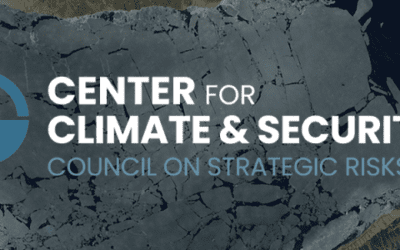by Rufus Pollock and Rosie Bell in Life Itself.org…Our new white paper on the polycrisis and metacrisis: what they are, how they are distinct, how they are related and why it matters.
Systemic risk and the polycrisis
by Florian U. Jehn in Existential Crunch…We now know that global systemic risk is the potential for disruption on a global scale, which is then realized because a single element in the system fails. The polycrisis is essentially the perfect storm we are experiencing right now of multiple global systemic risks being triggered at the same time, making each other worse and leading to a much more difficult response, as you have to put out so many fires at once.
A Logic For The Future
from the Long Now Foundation…Stephen Heintz and Kim Stanley Robinson will discuss our polycrisis, and the swift and holistic reform of global governance institutions that is needed to respond to these urgent transnational and planetary challenges we are facing.
What is this era of calamity we’re in? Some say ‘polycrisis’ captures it
by Matthew Cantor in The Guardian…The term ‘polycrisis’ has gained traction as we face one disaster after another. It’s overwhelming – but diagnosing the catastrophe is the first step to addressing it.
Yuen Yuen Ang argues that we need a fundamentally different way of thinking about our biggest global problems
by Yuen Yuen Ang in Interest.co.nz…The polycrisis is paralyzing only for those who are attached to the old order. For those who are not, it offers what I would call a “polytunity” to usher in new paradigms that invert the way we think about the development process, the sources of solutions, and the role of the state.
Leadership in the polycrisis: How UK defense training can help us navigate a future of unprecedented environmental disruption
by Laurie Laybourn and Matt Ince in the Center for Climate and Security…Explicit investments in the development of emerging as well as current leaders must be considered a core element of building resilience within the context of the deepening climate and ecological crisis. Better leadership—at all levels—will support decision advantage under more challenging conditions. A failure to make these investments in leaders is likely to significantly undermine the effectiveness of societies to handle growing systemic risks and, in turn, to ensure that collective sustainability efforts meet the critical threshold needed to avoid catastrophic runaway environmental change.
More in this category
‘Polycrisis’ threatens planetary health; UN calls for innovative solutions
by Sean Mowbray in Mongabay…Environmental, technological and social challenges are colliding to create a global polycrisis. This confluence of issues is in turn placing increased pressure on the already existing environmental challenges of rapid climate change, rampant pollution and biodiversity loss — ultimately threatening planetary health and human well-being.
Are journalists reporting the global polycrisis?
by Gabi Mocatta in Earth Journalism …This study clearly
establishes that
the term ‘global polycrisis’
is not widely recognized,
or used by journalists.
Second Renaissance: A time of civilizational crisis and awakening
by Sylvie Barbier, et al. in the whitepaper, The Second Renaissance is both a period and a movement: a “time between worlds”, and a growing movement of people working to build shared understanding towards a radically wiser
future.
The new hot wars
by Jeremy Brecher in Znetwork…The most blatant marker of the polycrisis is the burgeoning of war and preparation for war.

Positive Pathways report
by Michael Lawrence and Megan Shipman …..The Cascade Institute’s analysis on positive pathways through polycrisis
The view from Nairobi-Washington
by Tim Sahay and Kate Mackenzie in Phenomenal World…It is good for Southern elites to win such technology investments. But while the New Washington Consensus delivers full employment and trillions in deficit-financed welfarism and public investments in the North, the Nairobi-Washington vision for which Ruto is a stand-in is insufficient for fostering prosperity across the South—where debt-stressed countries with soaring joblessness are imposing class war austerity and privatization, amid Western intransigence in delivering touted financial architecture reforms.
The disruption nexus
by Roman Krznaric in aeon.com….Polycrisis. Metacrisis. Omnicrisis. Permacrisis. Call it what you like. We are immersed in an age of extreme turbulence and interconnected global threats. The system is starting to flicker – chronic droughts, melting glaciers, far-Right extremism, AI risk, bioweapons, rising food and energy prices, rampant viruses, cyberattacks.
Are we doomed? Here’s how to think about it
by Rivka Galchen in The New Yorker…..Climate change, artificial intelligence, nuclear annihilation, biological warfare—the field of existential risk is a way to reason through the dizzying, terrifying headlines.
A review of ‘navigating the polycrisis’: A map of collapse, utopia, and the many paths in between
by Ben Shread-Hewitt in Resilience.org…The Polycrisis is the breakdown of our future.
Biden and the spectre of polycrisis
by Edward Luce in Financial Times….So many crises assail the world that their spilling into each other and merging is a genuine risk
Dancing with a permanent emergency
by Jonathan Rowson in The Joyous Struggle….The climate crisis is still there, and it is a moral imperative to address it and it matters perhaps more than any other single issue matters. And yet, because we are so profoundly stuck, I think our best chance, perhaps our only chance, is to see the climate challenge through the prism of the metacrisis, with all that follows for educational and spiritual innovation, which is why that has become my professional focus. Once we realise that there is no way to act on climate change with the requisite skill, insight, legitimacy, and resolve without contending with the metacrisis, our sense of priority should change. There is, as they say, no way round but through.
History’s crisis detectives: How we’re using maths and data to reveal why societies collapse – and clues about the future
by Daniel Hoyer in The Conversation….Our goal is to find out what drove these societies into crisis, and then what factors seem to have determined whether people could course-correct to stave off devastation.

Global collaboration of scientists needed to solve polycrisis
in Cambridge University Press….“Above all else, the polycrisis concept emphasises that crises interact with one another in highly consequential ways that are grossly underappreciated by academic and policymaking institutions that study those crises individually, in separate silos.”

Polycrisis in the anthropocene: An invitation to contributions and debates
by Michael Lawrence in Cambridge University Press…The popularity of the term polycrisis suggests a growing demand for new thinking
about the world’s intersecting crises, but loose and haphazard uses of the concept impede knowledge
generation. The special issue, “Polycrisis in the Anthropocene,” aims to close the gap.

Has the “Polycrisis” overwhelmed us?
by Mark Leonard in Project Syndicate…Today’s global crises are not only competing for policymakers’ finite attention; they are increasingly feeding one another in unpredictable ways. Add the uncertainty around this year’s high-stakes elections in the United States and elsewhere, and you have a recipe for a Davos meeting defined by angst and paralysis.



